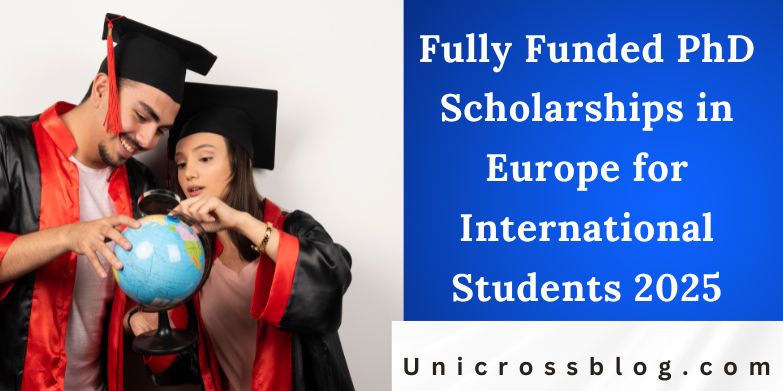Europe is a prime destination for international students pursuing advanced academic and research opportunities, offering a rich blend of world-class universities, cutting-edge research facilities, and vibrant cultural experiences. For those aiming to undertake a PhD, fully funded scholarships provide an accessible pathway by covering tuition fees, living expenses, and often additional costs like travel and health insurance.
These scholarships are highly competitive, designed to attract talented researchers from across the globe, particularly from developing countries, to contribute to Europe’s academic and innovation landscape. In 2025, numerous European countries and institutions offer fully funded PhD scholarships, making it an ideal time for international students to explore these opportunities.

Key Fully Funded PhD Scholarship Programs in Europe for 2025
1. Erasmus Mundus Joint Doctoral Programs
The Erasmus Mundus program, funded by the European Union, supports international students pursuing PhD degrees across multiple European universities. These programs foster interdisciplinary research and collaboration, offering students the chance to study in at least two European countries. Scholarships cover tuition fees, travel costs, insurance, and a generous monthly stipend for living expenses. Popular fields include science, technology, engineering, humanities, and social sciences.
Eligibility: Open to students worldwide, typically requiring a master’s degree in a relevant field, strong academic records, and proficiency in English (IELTS/TOEFL or equivalent may be required). Some programs accept alternative proof of English proficiency, such as prior education in English.
Benefits: Full tuition coverage, monthly stipend (approximately €1,500–€2,000), travel allowances, and health insurance.
Application Process: Applications are submitted through the Erasmus Mundus consortium websites, with deadlines typically between October and January for programs starting in 2025. Candidates must provide academic transcripts, a research proposal, letters of recommendation, and a CV.
2. Swiss Government Excellence Scholarships
Offered by the Swiss Confederation, these scholarships aim to promote international exchange and research cooperation. They are available for PhD and postdoctoral studies at Swiss universities, including renowned institutions like ETH Zurich and the University of Geneva.
Eligibility: Open to students from over 180 countries, with a preference for those under 35 years old at the time of application. A master’s degree, research proposal, and invitation from a Swiss academic supervisor are required.
Benefits: Monthly stipend (approximately CHF 1,920), tuition fee waivers, health insurance, and airfare.
Application Process: Applications open in August 2025 and close in December 2025, varying by country. Candidates submit applications through Swiss embassies, including academic records, a research plan, and reference letters.
3. DAAD Scholarships (Germany)
The German Academic Exchange Service (DAAD) offers fully funded PhD scholarships for international students, particularly from developing countries, to study at top German universities. Programs like the DAAD EPOS (Development-Related Postgraduate Courses) focus on fields such as sustainable development, engineering, and social sciences.
Eligibility: Applicants need a master’s degree, at least two years of professional experience for EPOS programs, and English or German proficiency depending on the program. A strong academic record and a clear research proposal are essential.
Benefits: Monthly stipend (€1,300 for PhD candidates), health insurance, travel allowance, and tuition fee coverage.
Application Process: Deadlines vary (often September to October 2025). Applications are submitted online via the DAAD portal, requiring transcripts, a CV, a research proposal, and recommendation letters.
4. Marie Skłodowska-Curie Actions (MSCA) Doctoral Networks
Funded under the EU’s Horizon Europe program, MSCA Doctoral Networks support early-stage researchers in interdisciplinary and intersectoral PhD programs. These scholarships are available across various fields, including STEM, social sciences, and humanities, at institutions throughout Europe.
Eligibility: Open to international students with less than four years of research experience and no PhD degree. A master’s degree and English proficiency are typically required.
Benefits: Competitive salary (approximately €3,000–€3,500 per month, depending on the country), research funding, and mobility allowances.
Application Process: Candidates apply through specific MSCA projects advertised by host institutions. Deadlines vary, often between September and November 2025. Required documents include a CV, motivation letter, and academic records.
5. Czech Government Scholarships
The Czech Republic offers fully funded scholarships for international students from developing countries to pursue PhD studies at public universities. Programs are available in fields like technical studies, agriculture, and social sciences, with some taught in English.
Eligibility: Applicants must hold a master’s degree, demonstrate academic excellence, and meet language requirements (English or Czech). Priority is given to candidates from countries without cultural cooperation agreements with the Czech Republic.
Benefits: Tuition fee waivers, monthly stipend, accommodation, and health insurance.
Application Process: Applications open in July 2025 and close in September 2025. Submission is through Czech embassies or the Ministry of Education, requiring academic documents, a study plan, and references.
6. European University Institute (EUI) PhD Scholarships
Located in Florence, Italy, the EUI offers fully funded four-year PhD programs in economics, history, law, and political and social sciences. These scholarships are ideal for students interested in interdisciplinary research with access to extensive resources like the Historical Archives of the European Union.
Eligibility: Open to all nationalities, requiring a master’s degree, a research proposal, and proficiency in English. Additional language certifications may be needed for specific programs.
Benefits: Full tuition coverage, monthly stipend (varies by country, approximately €1,500–€2,000), and health insurance.
Application Process: Applications open in November 2025 and close in January 2026. Candidates submit an online application with transcripts, a CV, a research proposal, and reference letters.
READ ALSO: Top 10 Scholarships for Women in STEM
FAQs
What does “fully funded” mean in the context of PhD scholarships?
Fully funded scholarships cover tuition fees, living expenses (via a monthly stipend), and often additional costs like travel, health insurance, and research expenses. This allows students to focus on their studies without financial burdens.
Who is eligible for these scholarships?
Eligibility varies by program but generally includes holding a master’s degree, demonstrating academic excellence, and meeting language proficiency requirements (often English, sometimes the host country’s language). Some programs prioritize applicants from developing countries or specific regions.
Do I need IELTS or TOEFL for these scholarships?
Many programs require proof of English proficiency (IELTS/TOEFL), but some, like those in Norway or certain Erasmus Mundus programs, may waive this if prior education was in English or accept alternatives like the Duolingo English Test.
When should I apply for 2025 scholarships?
Deadlines vary by program, typically falling between July and December 2025 for programs starting in the fall of 2025. Check specific program websites for exact dates and ensure early submission to meet embassy or institutional requirements.
Can I apply for multiple scholarships?
Yes, you can apply for multiple scholarships, provided you meet each program’s eligibility criteria. However, some scholarships may not allow simultaneous acceptance of other funding, so check terms carefully.
What documents are typically required?
Common requirements include academic transcripts, a master’s degree certificate, a research proposal, a CV, letters of recommendation, and proof of language proficiency. Some programs may also require a letter of invitation from a host supervisor.
Are these scholarships available for all fields of study?
Most scholarships cover a wide range of disciplines, including STEM, social sciences, humanities, and arts. However, some, like DAAD EPOS or MSCA, prioritize specific fields such as development-related studies or interdisciplinary research.







